A Critical Analysis on Employment Equality Law Concerning Discrimination on the Grounds of Religion in Ireland
VerifiedAdded on 2023/01/13
|14
|4924
|33
AI Summary
This paper critically analyzes the employment equality law concerning discrimination on the grounds of religion in Ireland. It discusses various scenarios and cases of religious discrimination faced by workers or employees.
Contribute Materials
Your contribution can guide someone’s learning journey. Share your
documents today.
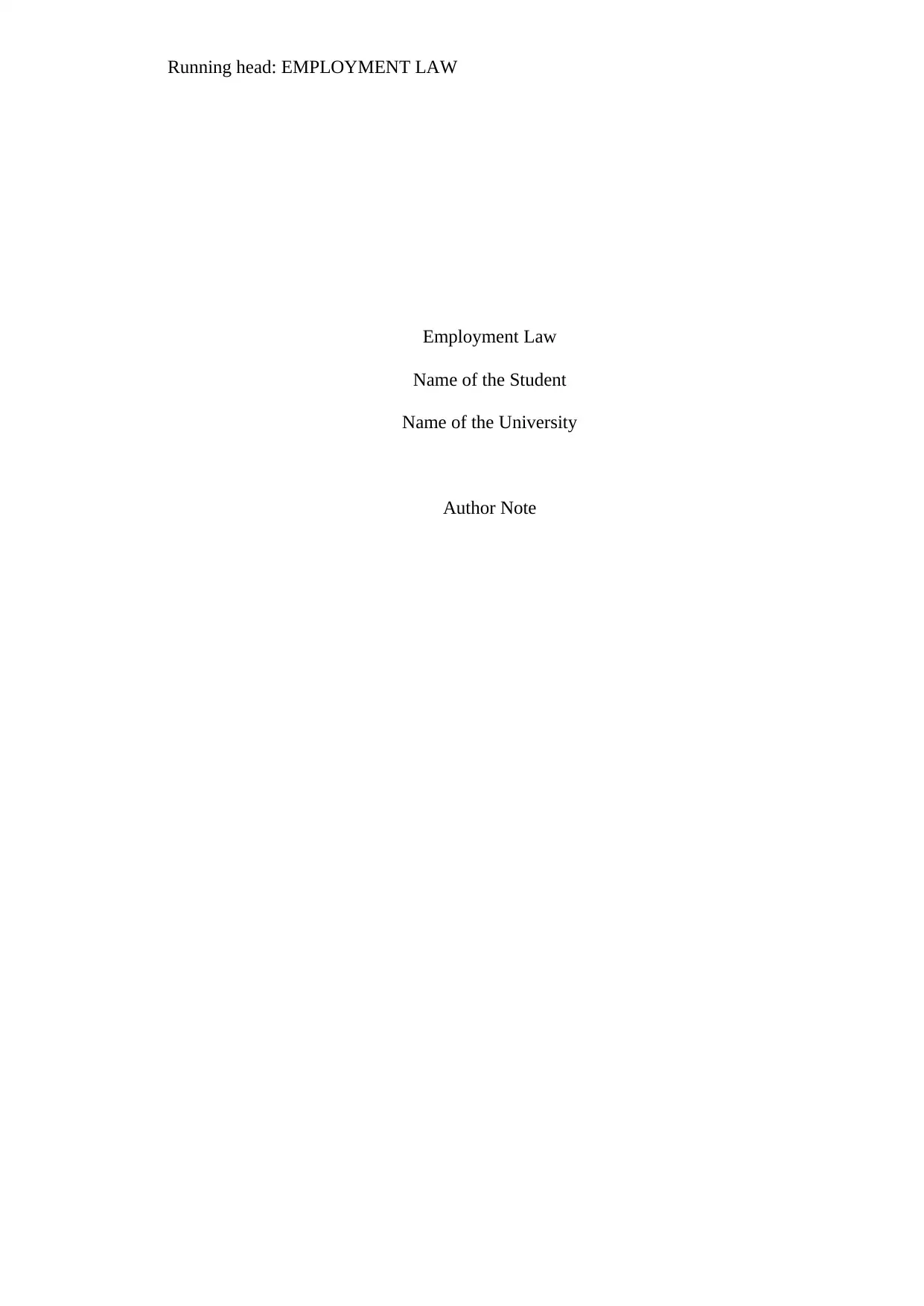
Running head: EMPLOYMENT LAW
Employment Law
Name of the Student
Name of the University
Author Note
Employment Law
Name of the Student
Name of the University
Author Note
Secure Best Marks with AI Grader
Need help grading? Try our AI Grader for instant feedback on your assignments.
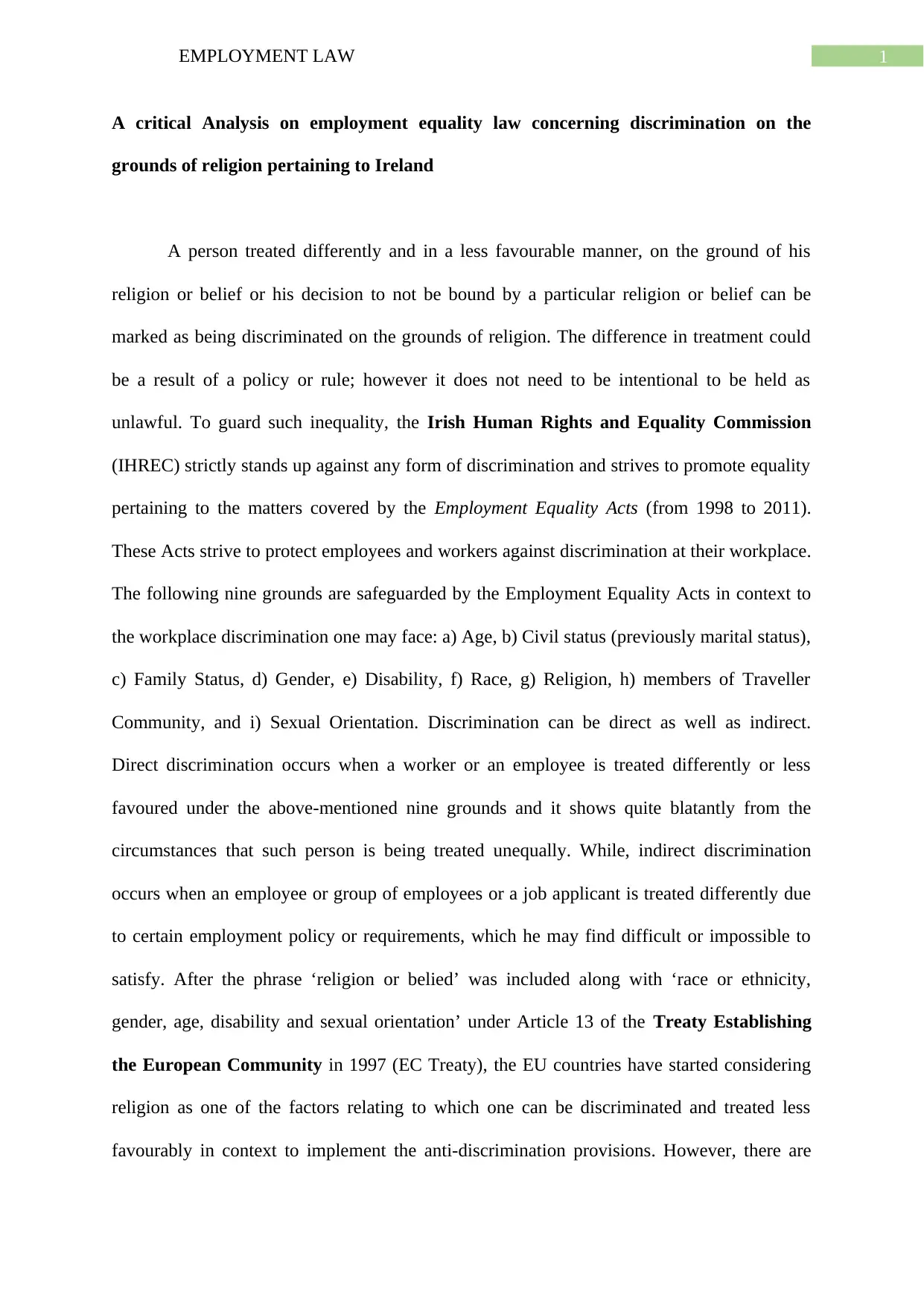
1EMPLOYMENT LAW
A critical Analysis on employment equality law concerning discrimination on the
grounds of religion pertaining to Ireland
A person treated differently and in a less favourable manner, on the ground of his
religion or belief or his decision to not be bound by a particular religion or belief can be
marked as being discriminated on the grounds of religion. The difference in treatment could
be a result of a policy or rule; however it does not need to be intentional to be held as
unlawful. To guard such inequality, the Irish Human Rights and Equality Commission
(IHREC) strictly stands up against any form of discrimination and strives to promote equality
pertaining to the matters covered by the Employment Equality Acts (from 1998 to 2011).
These Acts strive to protect employees and workers against discrimination at their workplace.
The following nine grounds are safeguarded by the Employment Equality Acts in context to
the workplace discrimination one may face: a) Age, b) Civil status (previously marital status),
c) Family Status, d) Gender, e) Disability, f) Race, g) Religion, h) members of Traveller
Community, and i) Sexual Orientation. Discrimination can be direct as well as indirect.
Direct discrimination occurs when a worker or an employee is treated differently or less
favoured under the above-mentioned nine grounds and it shows quite blatantly from the
circumstances that such person is being treated unequally. While, indirect discrimination
occurs when an employee or group of employees or a job applicant is treated differently due
to certain employment policy or requirements, which he may find difficult or impossible to
satisfy. After the phrase ‘religion or belied’ was included along with ‘race or ethnicity,
gender, age, disability and sexual orientation’ under Article 13 of the Treaty Establishing
the European Community in 1997 (EC Treaty), the EU countries have started considering
religion as one of the factors relating to which one can be discriminated and treated less
favourably in context to implement the anti-discrimination provisions. However, there are
A critical Analysis on employment equality law concerning discrimination on the
grounds of religion pertaining to Ireland
A person treated differently and in a less favourable manner, on the ground of his
religion or belief or his decision to not be bound by a particular religion or belief can be
marked as being discriminated on the grounds of religion. The difference in treatment could
be a result of a policy or rule; however it does not need to be intentional to be held as
unlawful. To guard such inequality, the Irish Human Rights and Equality Commission
(IHREC) strictly stands up against any form of discrimination and strives to promote equality
pertaining to the matters covered by the Employment Equality Acts (from 1998 to 2011).
These Acts strive to protect employees and workers against discrimination at their workplace.
The following nine grounds are safeguarded by the Employment Equality Acts in context to
the workplace discrimination one may face: a) Age, b) Civil status (previously marital status),
c) Family Status, d) Gender, e) Disability, f) Race, g) Religion, h) members of Traveller
Community, and i) Sexual Orientation. Discrimination can be direct as well as indirect.
Direct discrimination occurs when a worker or an employee is treated differently or less
favoured under the above-mentioned nine grounds and it shows quite blatantly from the
circumstances that such person is being treated unequally. While, indirect discrimination
occurs when an employee or group of employees or a job applicant is treated differently due
to certain employment policy or requirements, which he may find difficult or impossible to
satisfy. After the phrase ‘religion or belied’ was included along with ‘race or ethnicity,
gender, age, disability and sexual orientation’ under Article 13 of the Treaty Establishing
the European Community in 1997 (EC Treaty), the EU countries have started considering
religion as one of the factors relating to which one can be discriminated and treated less
favourably in context to implement the anti-discrimination provisions. However, there are
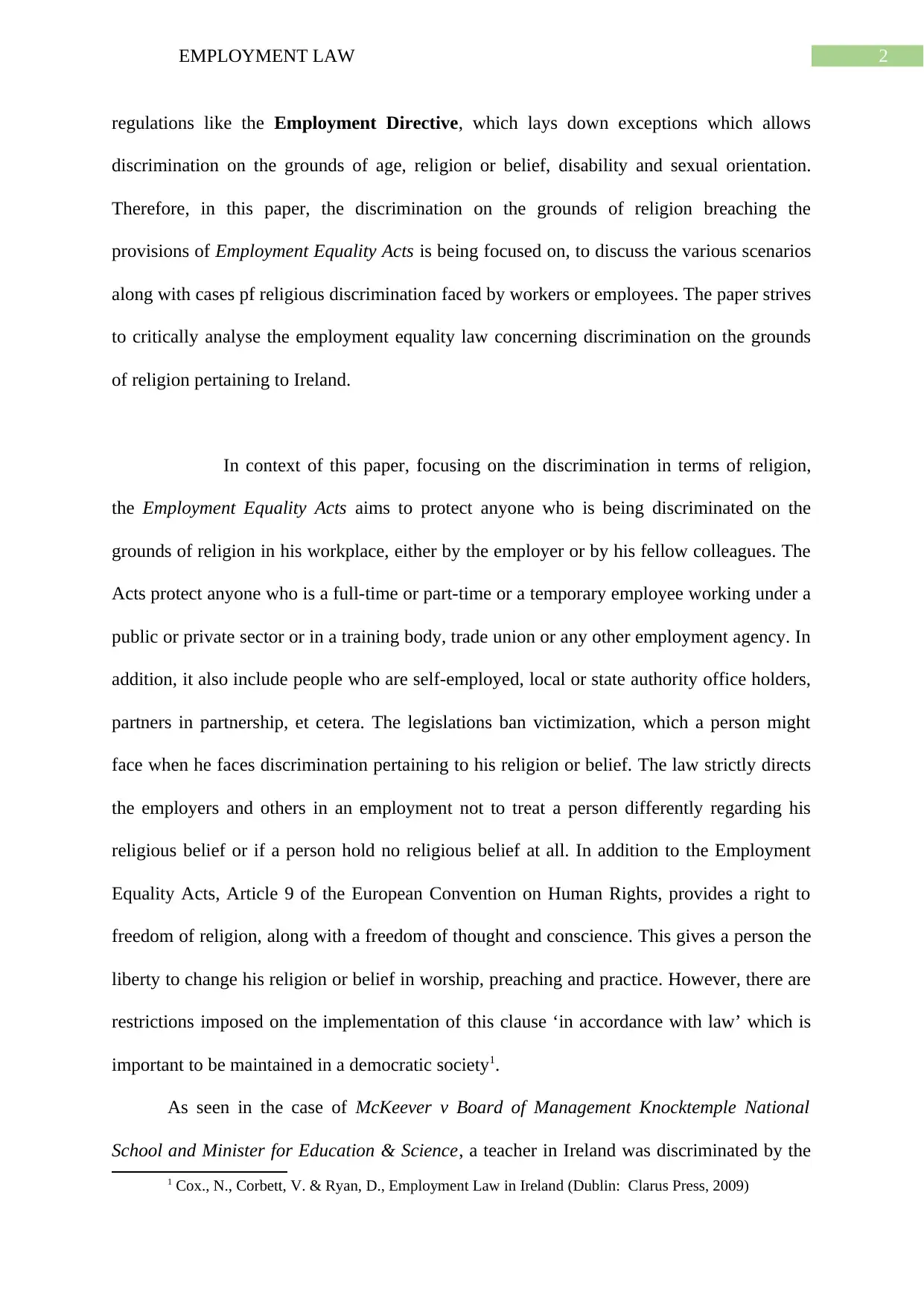
2EMPLOYMENT LAW
regulations like the Employment Directive, which lays down exceptions which allows
discrimination on the grounds of age, religion or belief, disability and sexual orientation.
Therefore, in this paper, the discrimination on the grounds of religion breaching the
provisions of Employment Equality Acts is being focused on, to discuss the various scenarios
along with cases pf religious discrimination faced by workers or employees. The paper strives
to critically analyse the employment equality law concerning discrimination on the grounds
of religion pertaining to Ireland.
In context of this paper, focusing on the discrimination in terms of religion,
the Employment Equality Acts aims to protect anyone who is being discriminated on the
grounds of religion in his workplace, either by the employer or by his fellow colleagues. The
Acts protect anyone who is a full-time or part-time or a temporary employee working under a
public or private sector or in a training body, trade union or any other employment agency. In
addition, it also include people who are self-employed, local or state authority office holders,
partners in partnership, et cetera. The legislations ban victimization, which a person might
face when he faces discrimination pertaining to his religion or belief. The law strictly directs
the employers and others in an employment not to treat a person differently regarding his
religious belief or if a person hold no religious belief at all. In addition to the Employment
Equality Acts, Article 9 of the European Convention on Human Rights, provides a right to
freedom of religion, along with a freedom of thought and conscience. This gives a person the
liberty to change his religion or belief in worship, preaching and practice. However, there are
restrictions imposed on the implementation of this clause ‘in accordance with law’ which is
important to be maintained in a democratic society1.
As seen in the case of McKeever v Board of Management Knocktemple National
School and Minister for Education & Science, a teacher in Ireland was discriminated by the
1 Cox., N., Corbett, V. & Ryan, D., Employment Law in Ireland (Dublin: Clarus Press, 2009)
regulations like the Employment Directive, which lays down exceptions which allows
discrimination on the grounds of age, religion or belief, disability and sexual orientation.
Therefore, in this paper, the discrimination on the grounds of religion breaching the
provisions of Employment Equality Acts is being focused on, to discuss the various scenarios
along with cases pf religious discrimination faced by workers or employees. The paper strives
to critically analyse the employment equality law concerning discrimination on the grounds
of religion pertaining to Ireland.
In context of this paper, focusing on the discrimination in terms of religion,
the Employment Equality Acts aims to protect anyone who is being discriminated on the
grounds of religion in his workplace, either by the employer or by his fellow colleagues. The
Acts protect anyone who is a full-time or part-time or a temporary employee working under a
public or private sector or in a training body, trade union or any other employment agency. In
addition, it also include people who are self-employed, local or state authority office holders,
partners in partnership, et cetera. The legislations ban victimization, which a person might
face when he faces discrimination pertaining to his religion or belief. The law strictly directs
the employers and others in an employment not to treat a person differently regarding his
religious belief or if a person hold no religious belief at all. In addition to the Employment
Equality Acts, Article 9 of the European Convention on Human Rights, provides a right to
freedom of religion, along with a freedom of thought and conscience. This gives a person the
liberty to change his religion or belief in worship, preaching and practice. However, there are
restrictions imposed on the implementation of this clause ‘in accordance with law’ which is
important to be maintained in a democratic society1.
As seen in the case of McKeever v Board of Management Knocktemple National
School and Minister for Education & Science, a teacher in Ireland was discriminated by the
1 Cox., N., Corbett, V. & Ryan, D., Employment Law in Ireland (Dublin: Clarus Press, 2009)
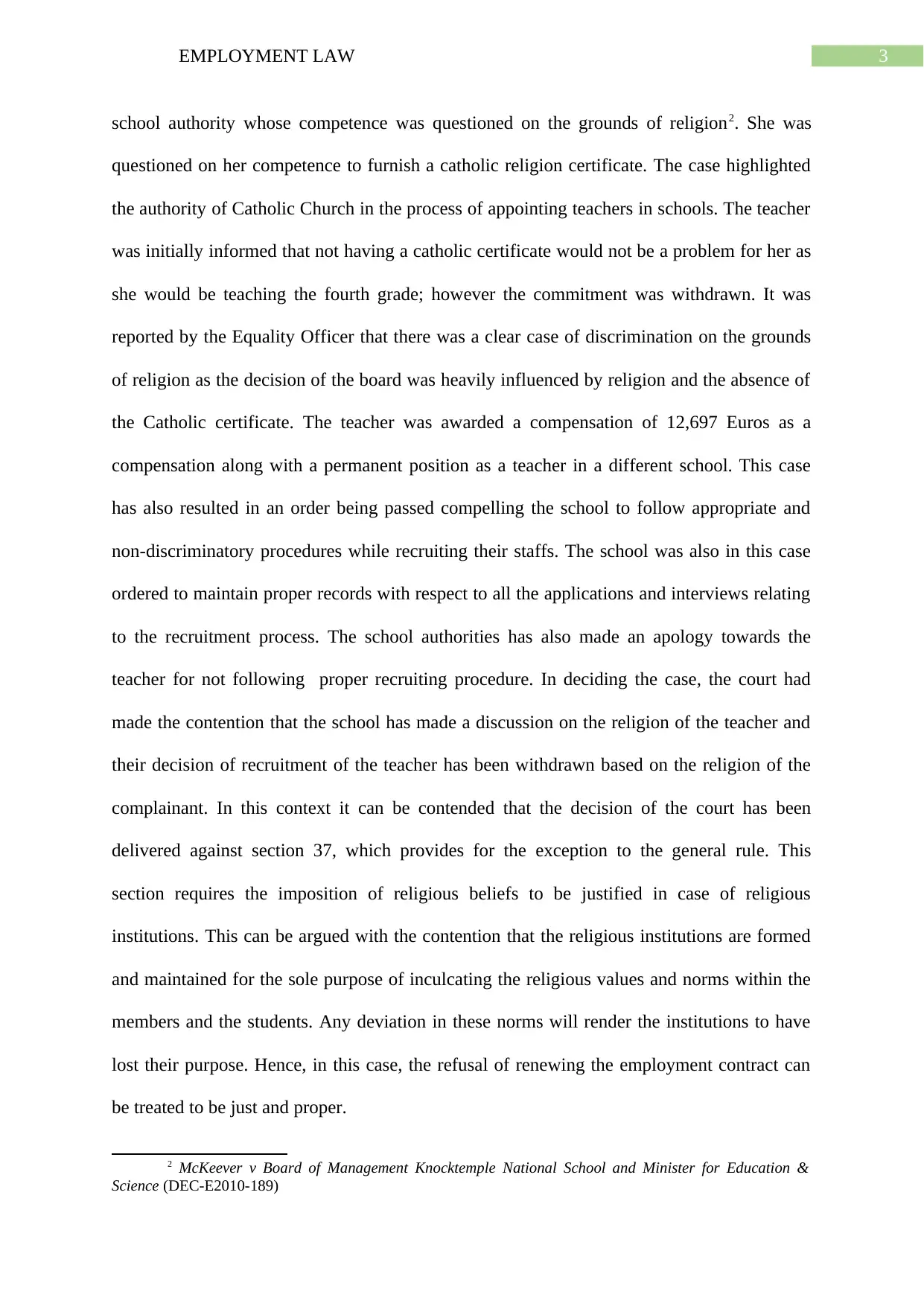
3EMPLOYMENT LAW
school authority whose competence was questioned on the grounds of religion2. She was
questioned on her competence to furnish a catholic religion certificate. The case highlighted
the authority of Catholic Church in the process of appointing teachers in schools. The teacher
was initially informed that not having a catholic certificate would not be a problem for her as
she would be teaching the fourth grade; however the commitment was withdrawn. It was
reported by the Equality Officer that there was a clear case of discrimination on the grounds
of religion as the decision of the board was heavily influenced by religion and the absence of
the Catholic certificate. The teacher was awarded a compensation of 12,697 Euros as a
compensation along with a permanent position as a teacher in a different school. This case
has also resulted in an order being passed compelling the school to follow appropriate and
non-discriminatory procedures while recruiting their staffs. The school was also in this case
ordered to maintain proper records with respect to all the applications and interviews relating
to the recruitment process. The school authorities has also made an apology towards the
teacher for not following proper recruiting procedure. In deciding the case, the court had
made the contention that the school has made a discussion on the religion of the teacher and
their decision of recruitment of the teacher has been withdrawn based on the religion of the
complainant. In this context it can be contended that the decision of the court has been
delivered against section 37, which provides for the exception to the general rule. This
section requires the imposition of religious beliefs to be justified in case of religious
institutions. This can be argued with the contention that the religious institutions are formed
and maintained for the sole purpose of inculcating the religious values and norms within the
members and the students. Any deviation in these norms will render the institutions to have
lost their purpose. Hence, in this case, the refusal of renewing the employment contract can
be treated to be just and proper.
2 McKeever v Board of Management Knocktemple National School and Minister for Education &
Science (DEC-E2010-189)
school authority whose competence was questioned on the grounds of religion2. She was
questioned on her competence to furnish a catholic religion certificate. The case highlighted
the authority of Catholic Church in the process of appointing teachers in schools. The teacher
was initially informed that not having a catholic certificate would not be a problem for her as
she would be teaching the fourth grade; however the commitment was withdrawn. It was
reported by the Equality Officer that there was a clear case of discrimination on the grounds
of religion as the decision of the board was heavily influenced by religion and the absence of
the Catholic certificate. The teacher was awarded a compensation of 12,697 Euros as a
compensation along with a permanent position as a teacher in a different school. This case
has also resulted in an order being passed compelling the school to follow appropriate and
non-discriminatory procedures while recruiting their staffs. The school was also in this case
ordered to maintain proper records with respect to all the applications and interviews relating
to the recruitment process. The school authorities has also made an apology towards the
teacher for not following proper recruiting procedure. In deciding the case, the court had
made the contention that the school has made a discussion on the religion of the teacher and
their decision of recruitment of the teacher has been withdrawn based on the religion of the
complainant. In this context it can be contended that the decision of the court has been
delivered against section 37, which provides for the exception to the general rule. This
section requires the imposition of religious beliefs to be justified in case of religious
institutions. This can be argued with the contention that the religious institutions are formed
and maintained for the sole purpose of inculcating the religious values and norms within the
members and the students. Any deviation in these norms will render the institutions to have
lost their purpose. Hence, in this case, the refusal of renewing the employment contract can
be treated to be just and proper.
2 McKeever v Board of Management Knocktemple National School and Minister for Education &
Science (DEC-E2010-189)
Secure Best Marks with AI Grader
Need help grading? Try our AI Grader for instant feedback on your assignments.
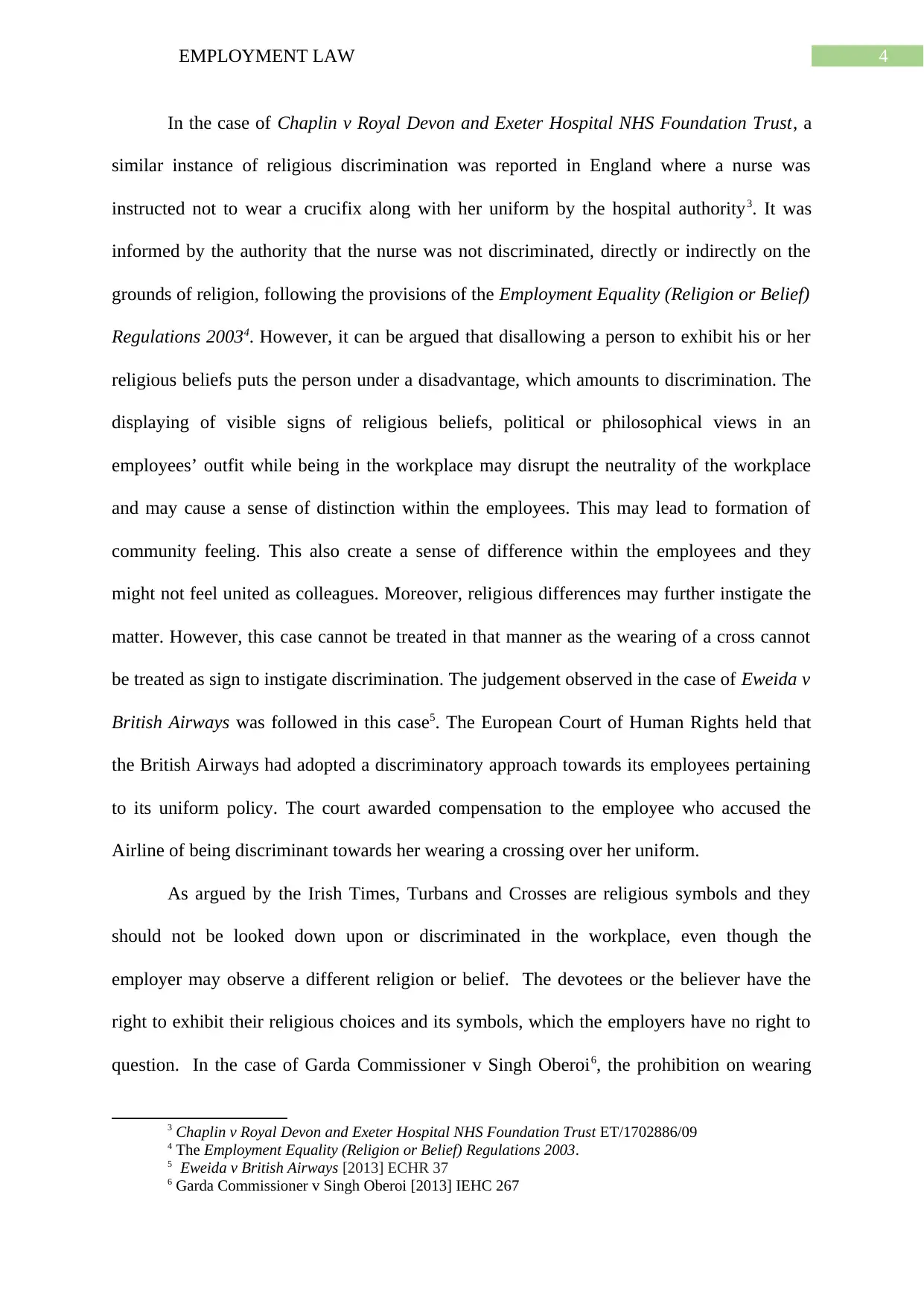
4EMPLOYMENT LAW
In the case of Chaplin v Royal Devon and Exeter Hospital NHS Foundation Trust, a
similar instance of religious discrimination was reported in England where a nurse was
instructed not to wear a crucifix along with her uniform by the hospital authority3. It was
informed by the authority that the nurse was not discriminated, directly or indirectly on the
grounds of religion, following the provisions of the Employment Equality (Religion or Belief)
Regulations 20034. However, it can be argued that disallowing a person to exhibit his or her
religious beliefs puts the person under a disadvantage, which amounts to discrimination. The
displaying of visible signs of religious beliefs, political or philosophical views in an
employees’ outfit while being in the workplace may disrupt the neutrality of the workplace
and may cause a sense of distinction within the employees. This may lead to formation of
community feeling. This also create a sense of difference within the employees and they
might not feel united as colleagues. Moreover, religious differences may further instigate the
matter. However, this case cannot be treated in that manner as the wearing of a cross cannot
be treated as sign to instigate discrimination. The judgement observed in the case of Eweida v
British Airways was followed in this case5. The European Court of Human Rights held that
the British Airways had adopted a discriminatory approach towards its employees pertaining
to its uniform policy. The court awarded compensation to the employee who accused the
Airline of being discriminant towards her wearing a crossing over her uniform.
As argued by the Irish Times, Turbans and Crosses are religious symbols and they
should not be looked down upon or discriminated in the workplace, even though the
employer may observe a different religion or belief. The devotees or the believer have the
right to exhibit their religious choices and its symbols, which the employers have no right to
question. In the case of Garda Commissioner v Singh Oberoi6, the prohibition on wearing
3 Chaplin v Royal Devon and Exeter Hospital NHS Foundation Trust ET/1702886/09
4 The Employment Equality (Religion or Belief) Regulations 2003.
5 Eweida v British Airways [2013] ECHR 37
6 Garda Commissioner v Singh Oberoi [2013] IEHC 267
In the case of Chaplin v Royal Devon and Exeter Hospital NHS Foundation Trust, a
similar instance of religious discrimination was reported in England where a nurse was
instructed not to wear a crucifix along with her uniform by the hospital authority3. It was
informed by the authority that the nurse was not discriminated, directly or indirectly on the
grounds of religion, following the provisions of the Employment Equality (Religion or Belief)
Regulations 20034. However, it can be argued that disallowing a person to exhibit his or her
religious beliefs puts the person under a disadvantage, which amounts to discrimination. The
displaying of visible signs of religious beliefs, political or philosophical views in an
employees’ outfit while being in the workplace may disrupt the neutrality of the workplace
and may cause a sense of distinction within the employees. This may lead to formation of
community feeling. This also create a sense of difference within the employees and they
might not feel united as colleagues. Moreover, religious differences may further instigate the
matter. However, this case cannot be treated in that manner as the wearing of a cross cannot
be treated as sign to instigate discrimination. The judgement observed in the case of Eweida v
British Airways was followed in this case5. The European Court of Human Rights held that
the British Airways had adopted a discriminatory approach towards its employees pertaining
to its uniform policy. The court awarded compensation to the employee who accused the
Airline of being discriminant towards her wearing a crossing over her uniform.
As argued by the Irish Times, Turbans and Crosses are religious symbols and they
should not be looked down upon or discriminated in the workplace, even though the
employer may observe a different religion or belief. The devotees or the believer have the
right to exhibit their religious choices and its symbols, which the employers have no right to
question. In the case of Garda Commissioner v Singh Oberoi6, the prohibition on wearing
3 Chaplin v Royal Devon and Exeter Hospital NHS Foundation Trust ET/1702886/09
4 The Employment Equality (Religion or Belief) Regulations 2003.
5 Eweida v British Airways [2013] ECHR 37
6 Garda Commissioner v Singh Oberoi [2013] IEHC 267
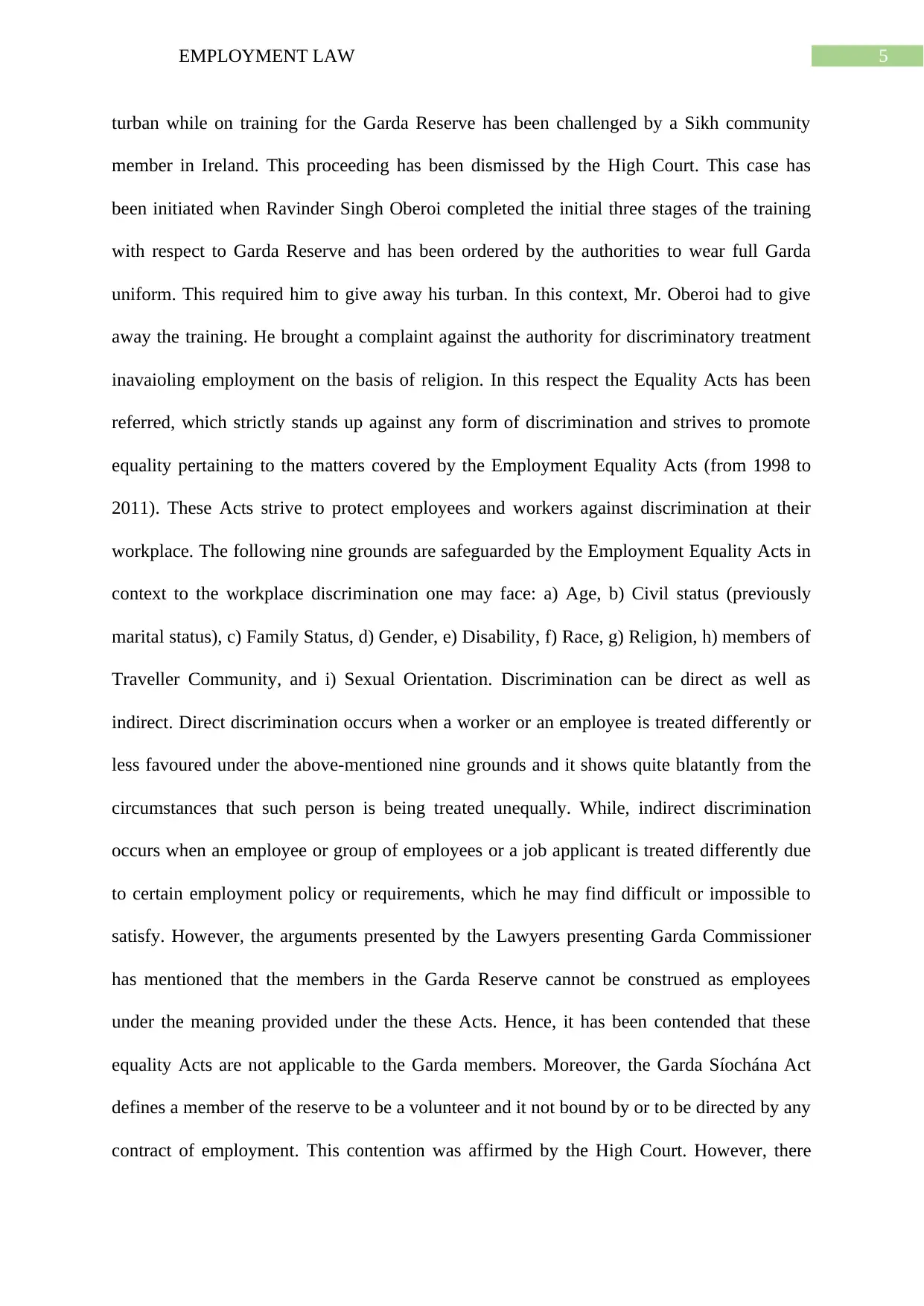
5EMPLOYMENT LAW
turban while on training for the Garda Reserve has been challenged by a Sikh community
member in Ireland. This proceeding has been dismissed by the High Court. This case has
been initiated when Ravinder Singh Oberoi completed the initial three stages of the training
with respect to Garda Reserve and has been ordered by the authorities to wear full Garda
uniform. This required him to give away his turban. In this context, Mr. Oberoi had to give
away the training. He brought a complaint against the authority for discriminatory treatment
inavaioling employment on the basis of religion. In this respect the Equality Acts has been
referred, which strictly stands up against any form of discrimination and strives to promote
equality pertaining to the matters covered by the Employment Equality Acts (from 1998 to
2011). These Acts strive to protect employees and workers against discrimination at their
workplace. The following nine grounds are safeguarded by the Employment Equality Acts in
context to the workplace discrimination one may face: a) Age, b) Civil status (previously
marital status), c) Family Status, d) Gender, e) Disability, f) Race, g) Religion, h) members of
Traveller Community, and i) Sexual Orientation. Discrimination can be direct as well as
indirect. Direct discrimination occurs when a worker or an employee is treated differently or
less favoured under the above-mentioned nine grounds and it shows quite blatantly from the
circumstances that such person is being treated unequally. While, indirect discrimination
occurs when an employee or group of employees or a job applicant is treated differently due
to certain employment policy or requirements, which he may find difficult or impossible to
satisfy. However, the arguments presented by the Lawyers presenting Garda Commissioner
has mentioned that the members in the Garda Reserve cannot be construed as employees
under the meaning provided under the these Acts. Hence, it has been contended that these
equality Acts are not applicable to the Garda members. Moreover, the Garda Síochána Act
defines a member of the reserve to be a volunteer and it not bound by or to be directed by any
contract of employment. This contention was affirmed by the High Court. However, there
turban while on training for the Garda Reserve has been challenged by a Sikh community
member in Ireland. This proceeding has been dismissed by the High Court. This case has
been initiated when Ravinder Singh Oberoi completed the initial three stages of the training
with respect to Garda Reserve and has been ordered by the authorities to wear full Garda
uniform. This required him to give away his turban. In this context, Mr. Oberoi had to give
away the training. He brought a complaint against the authority for discriminatory treatment
inavaioling employment on the basis of religion. In this respect the Equality Acts has been
referred, which strictly stands up against any form of discrimination and strives to promote
equality pertaining to the matters covered by the Employment Equality Acts (from 1998 to
2011). These Acts strive to protect employees and workers against discrimination at their
workplace. The following nine grounds are safeguarded by the Employment Equality Acts in
context to the workplace discrimination one may face: a) Age, b) Civil status (previously
marital status), c) Family Status, d) Gender, e) Disability, f) Race, g) Religion, h) members of
Traveller Community, and i) Sexual Orientation. Discrimination can be direct as well as
indirect. Direct discrimination occurs when a worker or an employee is treated differently or
less favoured under the above-mentioned nine grounds and it shows quite blatantly from the
circumstances that such person is being treated unequally. While, indirect discrimination
occurs when an employee or group of employees or a job applicant is treated differently due
to certain employment policy or requirements, which he may find difficult or impossible to
satisfy. However, the arguments presented by the Lawyers presenting Garda Commissioner
has mentioned that the members in the Garda Reserve cannot be construed as employees
under the meaning provided under the these Acts. Hence, it has been contended that these
equality Acts are not applicable to the Garda members. Moreover, the Garda Síochána Act
defines a member of the reserve to be a volunteer and it not bound by or to be directed by any
contract of employment. This contention was affirmed by the High Court. However, there
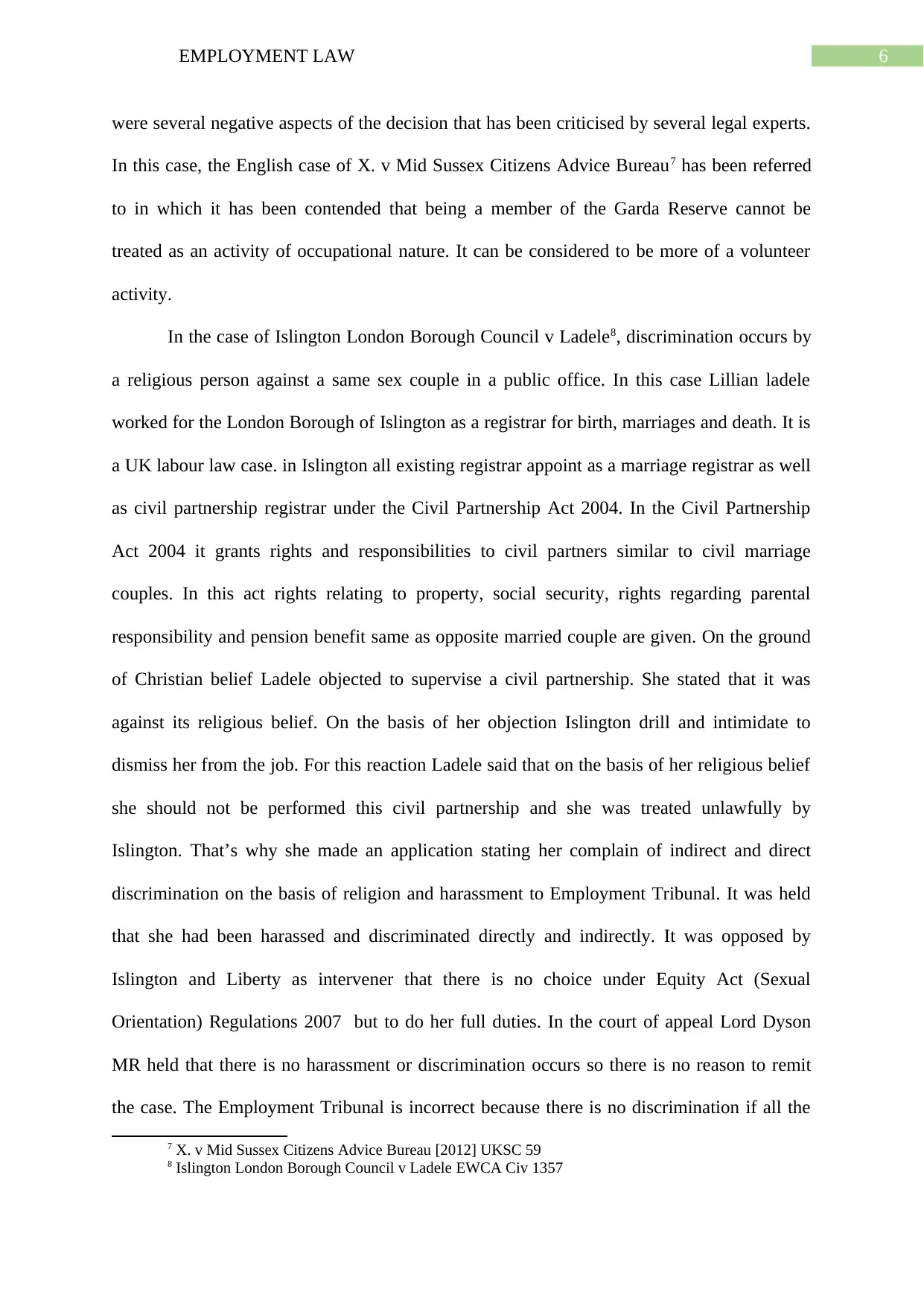
6EMPLOYMENT LAW
were several negative aspects of the decision that has been criticised by several legal experts.
In this case, the English case of X. v Mid Sussex Citizens Advice Bureau7 has been referred
to in which it has been contended that being a member of the Garda Reserve cannot be
treated as an activity of occupational nature. It can be considered to be more of a volunteer
activity.
In the case of Islington London Borough Council v Ladele8, discrimination occurs by
a religious person against a same sex couple in a public office. In this case Lillian ladele
worked for the London Borough of Islington as a registrar for birth, marriages and death. It is
a UK labour law case. in Islington all existing registrar appoint as a marriage registrar as well
as civil partnership registrar under the Civil Partnership Act 2004. In the Civil Partnership
Act 2004 it grants rights and responsibilities to civil partners similar to civil marriage
couples. In this act rights relating to property, social security, rights regarding parental
responsibility and pension benefit same as opposite married couple are given. On the ground
of Christian belief Ladele objected to supervise a civil partnership. She stated that it was
against its religious belief. On the basis of her objection Islington drill and intimidate to
dismiss her from the job. For this reaction Ladele said that on the basis of her religious belief
she should not be performed this civil partnership and she was treated unlawfully by
Islington. That’s why she made an application stating her complain of indirect and direct
discrimination on the basis of religion and harassment to Employment Tribunal. It was held
that she had been harassed and discriminated directly and indirectly. It was opposed by
Islington and Liberty as intervener that there is no choice under Equity Act (Sexual
Orientation) Regulations 2007 but to do her full duties. In the court of appeal Lord Dyson
MR held that there is no harassment or discrimination occurs so there is no reason to remit
the case. The Employment Tribunal is incorrect because there is no discrimination if all the
7 X. v Mid Sussex Citizens Advice Bureau [2012] UKSC 59
8 Islington London Borough Council v Ladele EWCA Civ 1357
were several negative aspects of the decision that has been criticised by several legal experts.
In this case, the English case of X. v Mid Sussex Citizens Advice Bureau7 has been referred
to in which it has been contended that being a member of the Garda Reserve cannot be
treated as an activity of occupational nature. It can be considered to be more of a volunteer
activity.
In the case of Islington London Borough Council v Ladele8, discrimination occurs by
a religious person against a same sex couple in a public office. In this case Lillian ladele
worked for the London Borough of Islington as a registrar for birth, marriages and death. It is
a UK labour law case. in Islington all existing registrar appoint as a marriage registrar as well
as civil partnership registrar under the Civil Partnership Act 2004. In the Civil Partnership
Act 2004 it grants rights and responsibilities to civil partners similar to civil marriage
couples. In this act rights relating to property, social security, rights regarding parental
responsibility and pension benefit same as opposite married couple are given. On the ground
of Christian belief Ladele objected to supervise a civil partnership. She stated that it was
against its religious belief. On the basis of her objection Islington drill and intimidate to
dismiss her from the job. For this reaction Ladele said that on the basis of her religious belief
she should not be performed this civil partnership and she was treated unlawfully by
Islington. That’s why she made an application stating her complain of indirect and direct
discrimination on the basis of religion and harassment to Employment Tribunal. It was held
that she had been harassed and discriminated directly and indirectly. It was opposed by
Islington and Liberty as intervener that there is no choice under Equity Act (Sexual
Orientation) Regulations 2007 but to do her full duties. In the court of appeal Lord Dyson
MR held that there is no harassment or discrimination occurs so there is no reason to remit
the case. The Employment Tribunal is incorrect because there is no discrimination if all the
7 X. v Mid Sussex Citizens Advice Bureau [2012] UKSC 59
8 Islington London Borough Council v Ladele EWCA Civ 1357
Paraphrase This Document
Need a fresh take? Get an instant paraphrase of this document with our AI Paraphraser
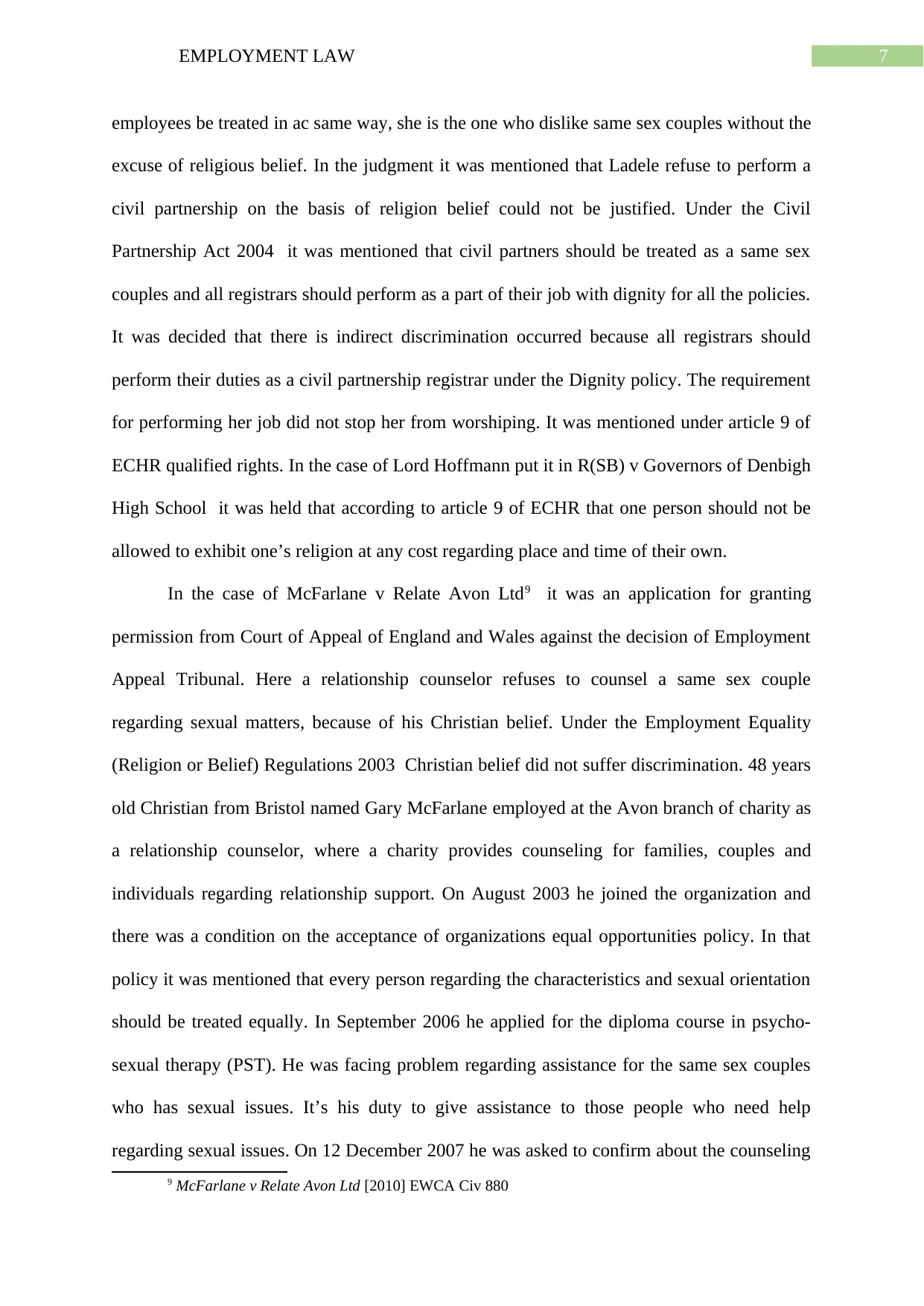
7EMPLOYMENT LAW
employees be treated in ac same way, she is the one who dislike same sex couples without the
excuse of religious belief. In the judgment it was mentioned that Ladele refuse to perform a
civil partnership on the basis of religion belief could not be justified. Under the Civil
Partnership Act 2004 it was mentioned that civil partners should be treated as a same sex
couples and all registrars should perform as a part of their job with dignity for all the policies.
It was decided that there is indirect discrimination occurred because all registrars should
perform their duties as a civil partnership registrar under the Dignity policy. The requirement
for performing her job did not stop her from worshiping. It was mentioned under article 9 of
ECHR qualified rights. In the case of Lord Hoffmann put it in R(SB) v Governors of Denbigh
High School it was held that according to article 9 of ECHR that one person should not be
allowed to exhibit one’s religion at any cost regarding place and time of their own.
In the case of McFarlane v Relate Avon Ltd9 it was an application for granting
permission from Court of Appeal of England and Wales against the decision of Employment
Appeal Tribunal. Here a relationship counselor refuses to counsel a same sex couple
regarding sexual matters, because of his Christian belief. Under the Employment Equality
(Religion or Belief) Regulations 2003 Christian belief did not suffer discrimination. 48 years
old Christian from Bristol named Gary McFarlane employed at the Avon branch of charity as
a relationship counselor, where a charity provides counseling for families, couples and
individuals regarding relationship support. On August 2003 he joined the organization and
there was a condition on the acceptance of organizations equal opportunities policy. In that
policy it was mentioned that every person regarding the characteristics and sexual orientation
should be treated equally. In September 2006 he applied for the diploma course in psycho-
sexual therapy (PST). He was facing problem regarding assistance for the same sex couples
who has sexual issues. It’s his duty to give assistance to those people who need help
regarding sexual issues. On 12 December 2007 he was asked to confirm about the counseling
9 McFarlane v Relate Avon Ltd [2010] EWCA Civ 880
employees be treated in ac same way, she is the one who dislike same sex couples without the
excuse of religious belief. In the judgment it was mentioned that Ladele refuse to perform a
civil partnership on the basis of religion belief could not be justified. Under the Civil
Partnership Act 2004 it was mentioned that civil partners should be treated as a same sex
couples and all registrars should perform as a part of their job with dignity for all the policies.
It was decided that there is indirect discrimination occurred because all registrars should
perform their duties as a civil partnership registrar under the Dignity policy. The requirement
for performing her job did not stop her from worshiping. It was mentioned under article 9 of
ECHR qualified rights. In the case of Lord Hoffmann put it in R(SB) v Governors of Denbigh
High School it was held that according to article 9 of ECHR that one person should not be
allowed to exhibit one’s religion at any cost regarding place and time of their own.
In the case of McFarlane v Relate Avon Ltd9 it was an application for granting
permission from Court of Appeal of England and Wales against the decision of Employment
Appeal Tribunal. Here a relationship counselor refuses to counsel a same sex couple
regarding sexual matters, because of his Christian belief. Under the Employment Equality
(Religion or Belief) Regulations 2003 Christian belief did not suffer discrimination. 48 years
old Christian from Bristol named Gary McFarlane employed at the Avon branch of charity as
a relationship counselor, where a charity provides counseling for families, couples and
individuals regarding relationship support. On August 2003 he joined the organization and
there was a condition on the acceptance of organizations equal opportunities policy. In that
policy it was mentioned that every person regarding the characteristics and sexual orientation
should be treated equally. In September 2006 he applied for the diploma course in psycho-
sexual therapy (PST). He was facing problem regarding assistance for the same sex couples
who has sexual issues. It’s his duty to give assistance to those people who need help
regarding sexual issues. On 12 December 2007 he was asked to confirm about the counseling
9 McFarlane v Relate Avon Ltd [2010] EWCA Civ 880
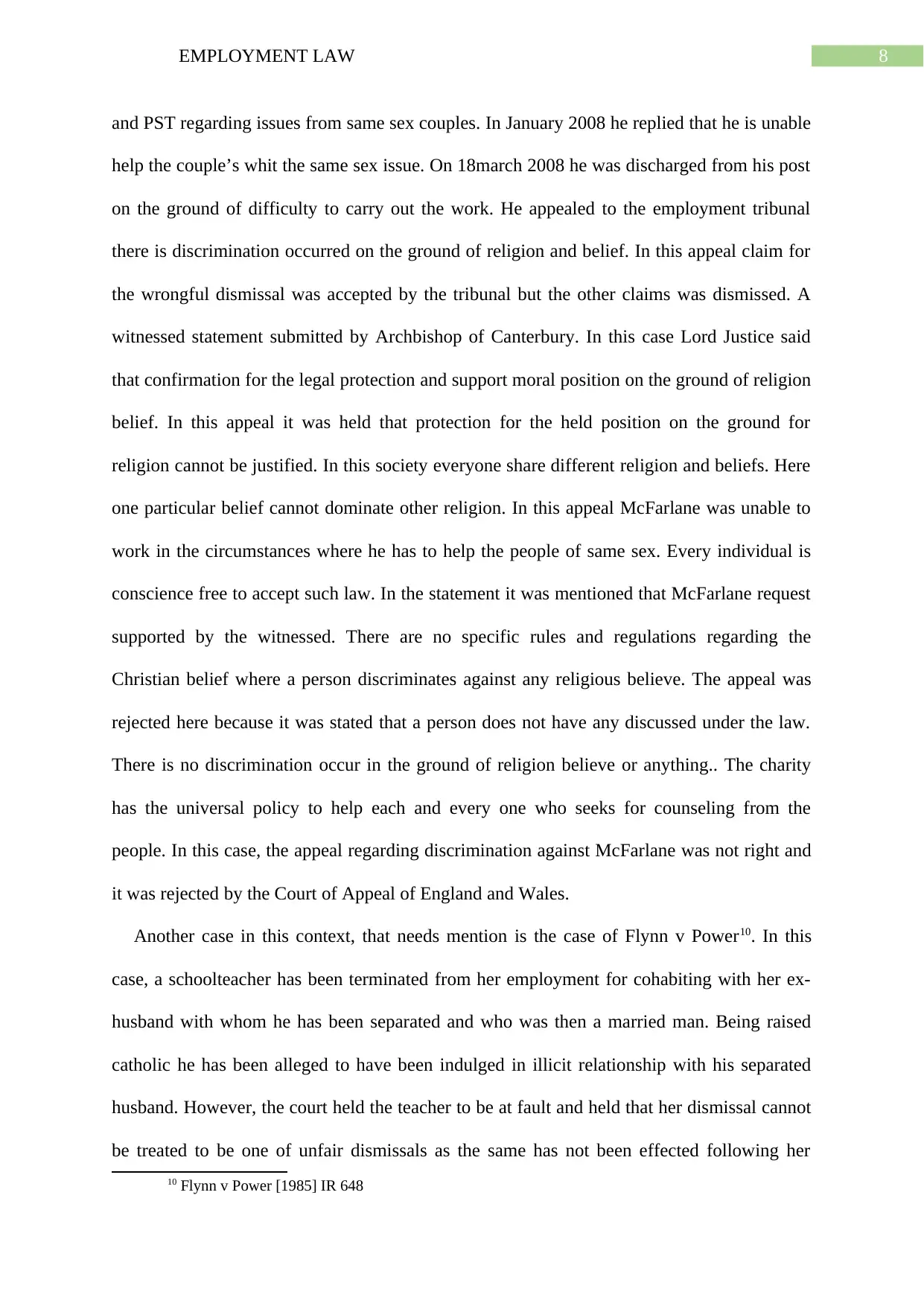
8EMPLOYMENT LAW
and PST regarding issues from same sex couples. In January 2008 he replied that he is unable
help the couple’s whit the same sex issue. On 18march 2008 he was discharged from his post
on the ground of difficulty to carry out the work. He appealed to the employment tribunal
there is discrimination occurred on the ground of religion and belief. In this appeal claim for
the wrongful dismissal was accepted by the tribunal but the other claims was dismissed. A
witnessed statement submitted by Archbishop of Canterbury. In this case Lord Justice said
that confirmation for the legal protection and support moral position on the ground of religion
belief. In this appeal it was held that protection for the held position on the ground for
religion cannot be justified. In this society everyone share different religion and beliefs. Here
one particular belief cannot dominate other religion. In this appeal McFarlane was unable to
work in the circumstances where he has to help the people of same sex. Every individual is
conscience free to accept such law. In the statement it was mentioned that McFarlane request
supported by the witnessed. There are no specific rules and regulations regarding the
Christian belief where a person discriminates against any religious believe. The appeal was
rejected here because it was stated that a person does not have any discussed under the law.
There is no discrimination occur in the ground of religion believe or anything.. The charity
has the universal policy to help each and every one who seeks for counseling from the
people. In this case, the appeal regarding discrimination against McFarlane was not right and
it was rejected by the Court of Appeal of England and Wales.
Another case in this context, that needs mention is the case of Flynn v Power10. In this
case, a schoolteacher has been terminated from her employment for cohabiting with her ex-
husband with whom he has been separated and who was then a married man. Being raised
catholic he has been alleged to have been indulged in illicit relationship with his separated
husband. However, the court held the teacher to be at fault and held that her dismissal cannot
be treated to be one of unfair dismissals as the same has not been effected following her
10 Flynn v Power [1985] IR 648
and PST regarding issues from same sex couples. In January 2008 he replied that he is unable
help the couple’s whit the same sex issue. On 18march 2008 he was discharged from his post
on the ground of difficulty to carry out the work. He appealed to the employment tribunal
there is discrimination occurred on the ground of religion and belief. In this appeal claim for
the wrongful dismissal was accepted by the tribunal but the other claims was dismissed. A
witnessed statement submitted by Archbishop of Canterbury. In this case Lord Justice said
that confirmation for the legal protection and support moral position on the ground of religion
belief. In this appeal it was held that protection for the held position on the ground for
religion cannot be justified. In this society everyone share different religion and beliefs. Here
one particular belief cannot dominate other religion. In this appeal McFarlane was unable to
work in the circumstances where he has to help the people of same sex. Every individual is
conscience free to accept such law. In the statement it was mentioned that McFarlane request
supported by the witnessed. There are no specific rules and regulations regarding the
Christian belief where a person discriminates against any religious believe. The appeal was
rejected here because it was stated that a person does not have any discussed under the law.
There is no discrimination occur in the ground of religion believe or anything.. The charity
has the universal policy to help each and every one who seeks for counseling from the
people. In this case, the appeal regarding discrimination against McFarlane was not right and
it was rejected by the Court of Appeal of England and Wales.
Another case in this context, that needs mention is the case of Flynn v Power10. In this
case, a schoolteacher has been terminated from her employment for cohabiting with her ex-
husband with whom he has been separated and who was then a married man. Being raised
catholic he has been alleged to have been indulged in illicit relationship with his separated
husband. However, the court held the teacher to be at fault and held that her dismissal cannot
be treated to be one of unfair dismissals as the same has not been effected following her
10 Flynn v Power [1985] IR 648
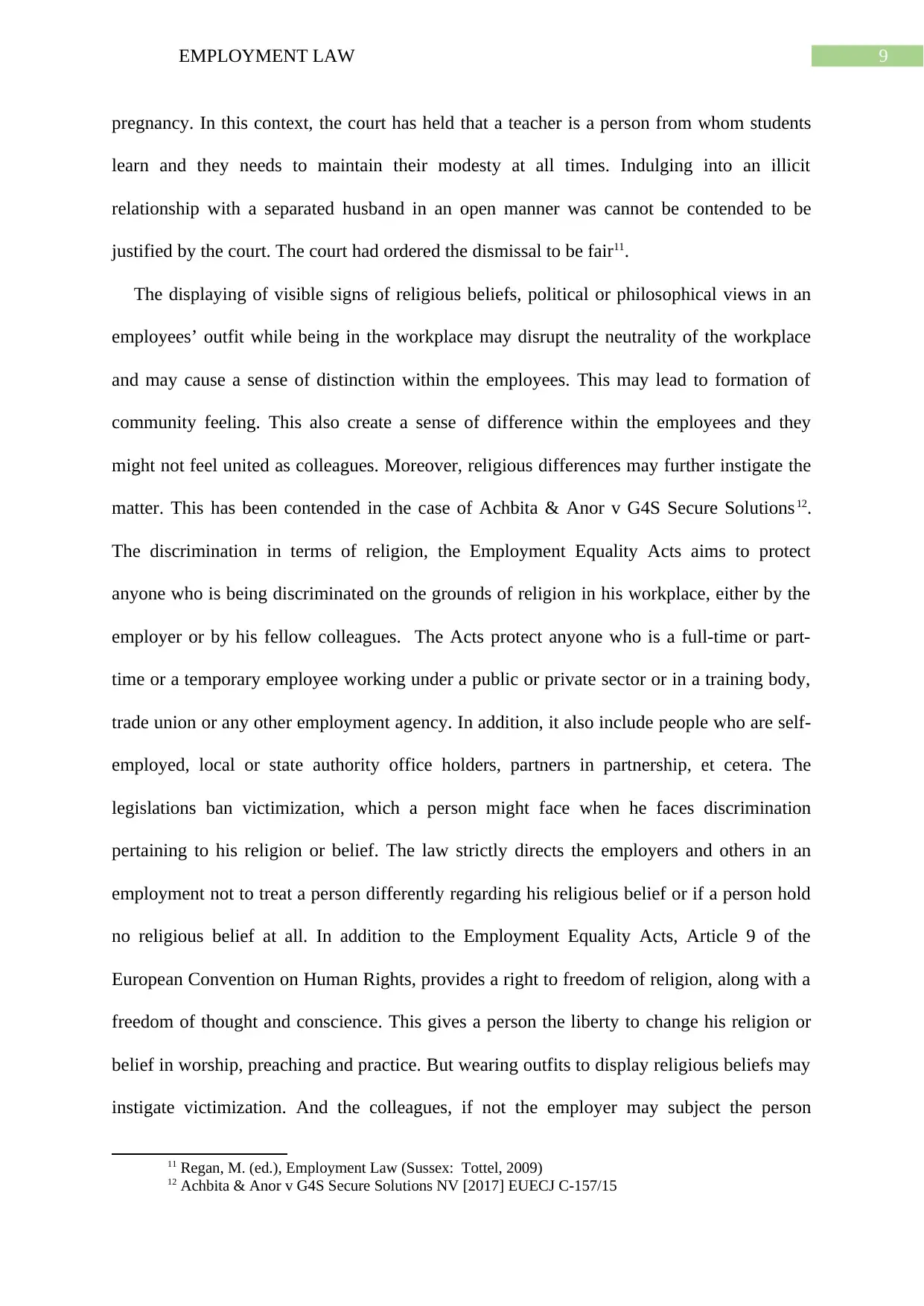
9EMPLOYMENT LAW
pregnancy. In this context, the court has held that a teacher is a person from whom students
learn and they needs to maintain their modesty at all times. Indulging into an illicit
relationship with a separated husband in an open manner was cannot be contended to be
justified by the court. The court had ordered the dismissal to be fair11.
The displaying of visible signs of religious beliefs, political or philosophical views in an
employees’ outfit while being in the workplace may disrupt the neutrality of the workplace
and may cause a sense of distinction within the employees. This may lead to formation of
community feeling. This also create a sense of difference within the employees and they
might not feel united as colleagues. Moreover, religious differences may further instigate the
matter. This has been contended in the case of Achbita & Anor v G4S Secure Solutions12.
The discrimination in terms of religion, the Employment Equality Acts aims to protect
anyone who is being discriminated on the grounds of religion in his workplace, either by the
employer or by his fellow colleagues. The Acts protect anyone who is a full-time or part-
time or a temporary employee working under a public or private sector or in a training body,
trade union or any other employment agency. In addition, it also include people who are self-
employed, local or state authority office holders, partners in partnership, et cetera. The
legislations ban victimization, which a person might face when he faces discrimination
pertaining to his religion or belief. The law strictly directs the employers and others in an
employment not to treat a person differently regarding his religious belief or if a person hold
no religious belief at all. In addition to the Employment Equality Acts, Article 9 of the
European Convention on Human Rights, provides a right to freedom of religion, along with a
freedom of thought and conscience. This gives a person the liberty to change his religion or
belief in worship, preaching and practice. But wearing outfits to display religious beliefs may
instigate victimization. And the colleagues, if not the employer may subject the person
11 Regan, M. (ed.), Employment Law (Sussex: Tottel, 2009)
12 Achbita & Anor v G4S Secure Solutions NV [2017] EUECJ C-157/15
pregnancy. In this context, the court has held that a teacher is a person from whom students
learn and they needs to maintain their modesty at all times. Indulging into an illicit
relationship with a separated husband in an open manner was cannot be contended to be
justified by the court. The court had ordered the dismissal to be fair11.
The displaying of visible signs of religious beliefs, political or philosophical views in an
employees’ outfit while being in the workplace may disrupt the neutrality of the workplace
and may cause a sense of distinction within the employees. This may lead to formation of
community feeling. This also create a sense of difference within the employees and they
might not feel united as colleagues. Moreover, religious differences may further instigate the
matter. This has been contended in the case of Achbita & Anor v G4S Secure Solutions12.
The discrimination in terms of religion, the Employment Equality Acts aims to protect
anyone who is being discriminated on the grounds of religion in his workplace, either by the
employer or by his fellow colleagues. The Acts protect anyone who is a full-time or part-
time or a temporary employee working under a public or private sector or in a training body,
trade union or any other employment agency. In addition, it also include people who are self-
employed, local or state authority office holders, partners in partnership, et cetera. The
legislations ban victimization, which a person might face when he faces discrimination
pertaining to his religion or belief. The law strictly directs the employers and others in an
employment not to treat a person differently regarding his religious belief or if a person hold
no religious belief at all. In addition to the Employment Equality Acts, Article 9 of the
European Convention on Human Rights, provides a right to freedom of religion, along with a
freedom of thought and conscience. This gives a person the liberty to change his religion or
belief in worship, preaching and practice. But wearing outfits to display religious beliefs may
instigate victimization. And the colleagues, if not the employer may subject the person
11 Regan, M. (ed.), Employment Law (Sussex: Tottel, 2009)
12 Achbita & Anor v G4S Secure Solutions NV [2017] EUECJ C-157/15
Secure Best Marks with AI Grader
Need help grading? Try our AI Grader for instant feedback on your assignments.
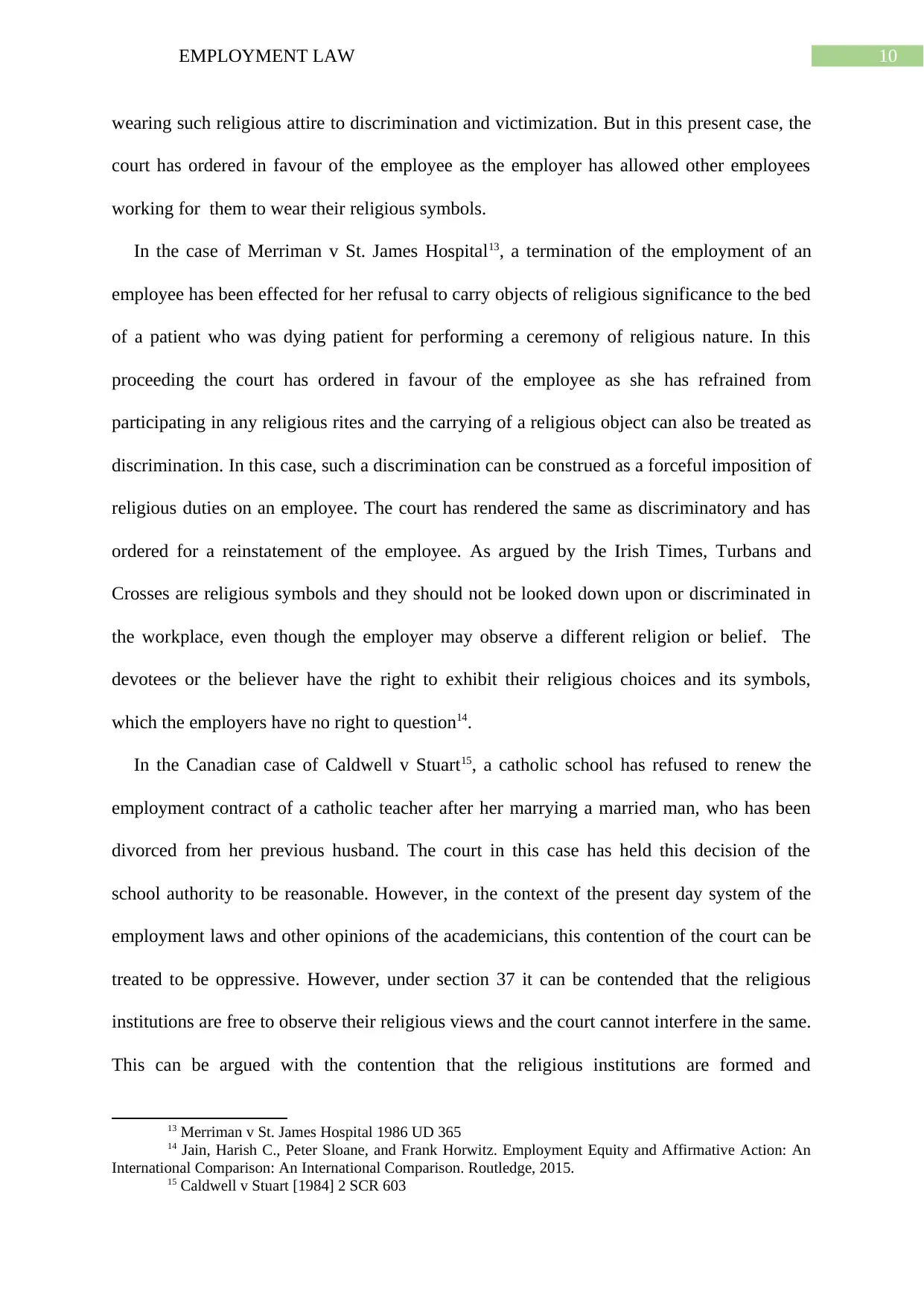
10EMPLOYMENT LAW
wearing such religious attire to discrimination and victimization. But in this present case, the
court has ordered in favour of the employee as the employer has allowed other employees
working for them to wear their religious symbols.
In the case of Merriman v St. James Hospital13, a termination of the employment of an
employee has been effected for her refusal to carry objects of religious significance to the bed
of a patient who was dying patient for performing a ceremony of religious nature. In this
proceeding the court has ordered in favour of the employee as she has refrained from
participating in any religious rites and the carrying of a religious object can also be treated as
discrimination. In this case, such a discrimination can be construed as a forceful imposition of
religious duties on an employee. The court has rendered the same as discriminatory and has
ordered for a reinstatement of the employee. As argued by the Irish Times, Turbans and
Crosses are religious symbols and they should not be looked down upon or discriminated in
the workplace, even though the employer may observe a different religion or belief. The
devotees or the believer have the right to exhibit their religious choices and its symbols,
which the employers have no right to question14.
In the Canadian case of Caldwell v Stuart15, a catholic school has refused to renew the
employment contract of a catholic teacher after her marrying a married man, who has been
divorced from her previous husband. The court in this case has held this decision of the
school authority to be reasonable. However, in the context of the present day system of the
employment laws and other opinions of the academicians, this contention of the court can be
treated to be oppressive. However, under section 37 it can be contended that the religious
institutions are free to observe their religious views and the court cannot interfere in the same.
This can be argued with the contention that the religious institutions are formed and
13 Merriman v St. James Hospital 1986 UD 365
14 Jain, Harish C., Peter Sloane, and Frank Horwitz. Employment Equity and Affirmative Action: An
International Comparison: An International Comparison. Routledge, 2015.
15 Caldwell v Stuart [1984] 2 SCR 603
wearing such religious attire to discrimination and victimization. But in this present case, the
court has ordered in favour of the employee as the employer has allowed other employees
working for them to wear their religious symbols.
In the case of Merriman v St. James Hospital13, a termination of the employment of an
employee has been effected for her refusal to carry objects of religious significance to the bed
of a patient who was dying patient for performing a ceremony of religious nature. In this
proceeding the court has ordered in favour of the employee as she has refrained from
participating in any religious rites and the carrying of a religious object can also be treated as
discrimination. In this case, such a discrimination can be construed as a forceful imposition of
religious duties on an employee. The court has rendered the same as discriminatory and has
ordered for a reinstatement of the employee. As argued by the Irish Times, Turbans and
Crosses are religious symbols and they should not be looked down upon or discriminated in
the workplace, even though the employer may observe a different religion or belief. The
devotees or the believer have the right to exhibit their religious choices and its symbols,
which the employers have no right to question14.
In the Canadian case of Caldwell v Stuart15, a catholic school has refused to renew the
employment contract of a catholic teacher after her marrying a married man, who has been
divorced from her previous husband. The court in this case has held this decision of the
school authority to be reasonable. However, in the context of the present day system of the
employment laws and other opinions of the academicians, this contention of the court can be
treated to be oppressive. However, under section 37 it can be contended that the religious
institutions are free to observe their religious views and the court cannot interfere in the same.
This can be argued with the contention that the religious institutions are formed and
13 Merriman v St. James Hospital 1986 UD 365
14 Jain, Harish C., Peter Sloane, and Frank Horwitz. Employment Equity and Affirmative Action: An
International Comparison: An International Comparison. Routledge, 2015.
15 Caldwell v Stuart [1984] 2 SCR 603
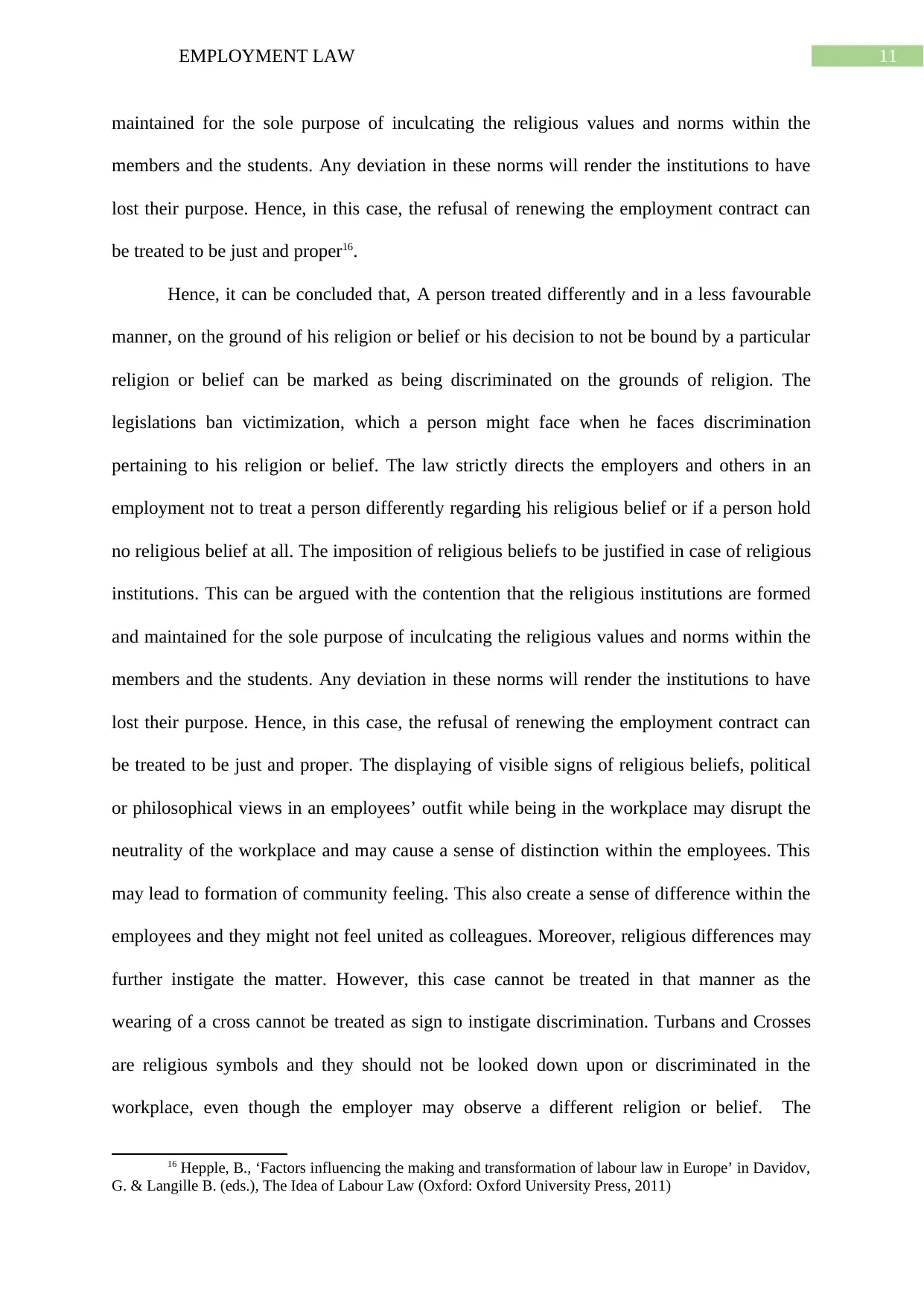
11EMPLOYMENT LAW
maintained for the sole purpose of inculcating the religious values and norms within the
members and the students. Any deviation in these norms will render the institutions to have
lost their purpose. Hence, in this case, the refusal of renewing the employment contract can
be treated to be just and proper16.
Hence, it can be concluded that, A person treated differently and in a less favourable
manner, on the ground of his religion or belief or his decision to not be bound by a particular
religion or belief can be marked as being discriminated on the grounds of religion. The
legislations ban victimization, which a person might face when he faces discrimination
pertaining to his religion or belief. The law strictly directs the employers and others in an
employment not to treat a person differently regarding his religious belief or if a person hold
no religious belief at all. The imposition of religious beliefs to be justified in case of religious
institutions. This can be argued with the contention that the religious institutions are formed
and maintained for the sole purpose of inculcating the religious values and norms within the
members and the students. Any deviation in these norms will render the institutions to have
lost their purpose. Hence, in this case, the refusal of renewing the employment contract can
be treated to be just and proper. The displaying of visible signs of religious beliefs, political
or philosophical views in an employees’ outfit while being in the workplace may disrupt the
neutrality of the workplace and may cause a sense of distinction within the employees. This
may lead to formation of community feeling. This also create a sense of difference within the
employees and they might not feel united as colleagues. Moreover, religious differences may
further instigate the matter. However, this case cannot be treated in that manner as the
wearing of a cross cannot be treated as sign to instigate discrimination. Turbans and Crosses
are religious symbols and they should not be looked down upon or discriminated in the
workplace, even though the employer may observe a different religion or belief. The
16 Hepple, B., ‘Factors influencing the making and transformation of labour law in Europe’ in Davidov,
G. & Langille B. (eds.), The Idea of Labour Law (Oxford: Oxford University Press, 2011)
maintained for the sole purpose of inculcating the religious values and norms within the
members and the students. Any deviation in these norms will render the institutions to have
lost their purpose. Hence, in this case, the refusal of renewing the employment contract can
be treated to be just and proper16.
Hence, it can be concluded that, A person treated differently and in a less favourable
manner, on the ground of his religion or belief or his decision to not be bound by a particular
religion or belief can be marked as being discriminated on the grounds of religion. The
legislations ban victimization, which a person might face when he faces discrimination
pertaining to his religion or belief. The law strictly directs the employers and others in an
employment not to treat a person differently regarding his religious belief or if a person hold
no religious belief at all. The imposition of religious beliefs to be justified in case of religious
institutions. This can be argued with the contention that the religious institutions are formed
and maintained for the sole purpose of inculcating the religious values and norms within the
members and the students. Any deviation in these norms will render the institutions to have
lost their purpose. Hence, in this case, the refusal of renewing the employment contract can
be treated to be just and proper. The displaying of visible signs of religious beliefs, political
or philosophical views in an employees’ outfit while being in the workplace may disrupt the
neutrality of the workplace and may cause a sense of distinction within the employees. This
may lead to formation of community feeling. This also create a sense of difference within the
employees and they might not feel united as colleagues. Moreover, religious differences may
further instigate the matter. However, this case cannot be treated in that manner as the
wearing of a cross cannot be treated as sign to instigate discrimination. Turbans and Crosses
are religious symbols and they should not be looked down upon or discriminated in the
workplace, even though the employer may observe a different religion or belief. The
16 Hepple, B., ‘Factors influencing the making and transformation of labour law in Europe’ in Davidov,
G. & Langille B. (eds.), The Idea of Labour Law (Oxford: Oxford University Press, 2011)
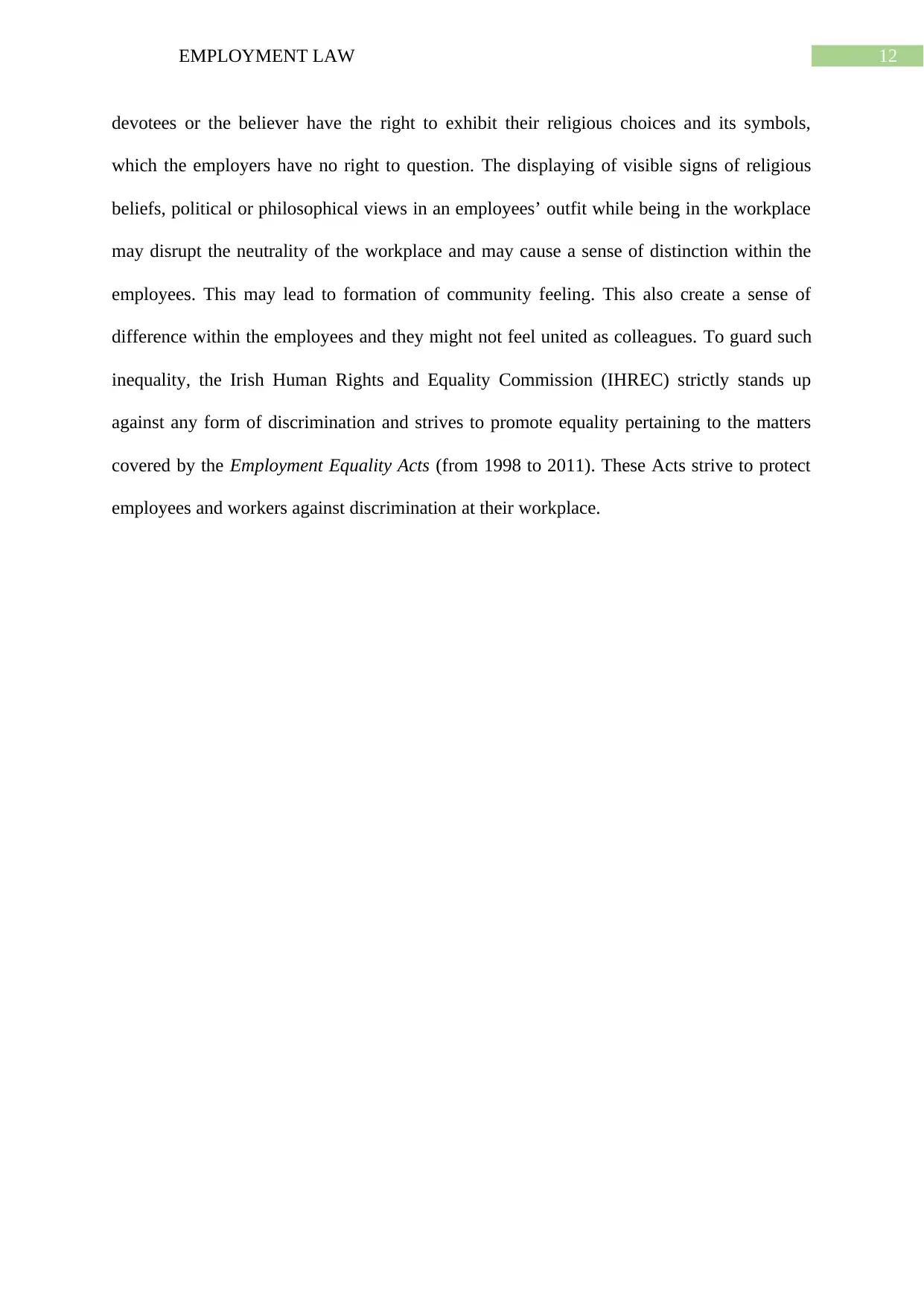
12EMPLOYMENT LAW
devotees or the believer have the right to exhibit their religious choices and its symbols,
which the employers have no right to question. The displaying of visible signs of religious
beliefs, political or philosophical views in an employees’ outfit while being in the workplace
may disrupt the neutrality of the workplace and may cause a sense of distinction within the
employees. This may lead to formation of community feeling. This also create a sense of
difference within the employees and they might not feel united as colleagues. To guard such
inequality, the Irish Human Rights and Equality Commission (IHREC) strictly stands up
against any form of discrimination and strives to promote equality pertaining to the matters
covered by the Employment Equality Acts (from 1998 to 2011). These Acts strive to protect
employees and workers against discrimination at their workplace.
devotees or the believer have the right to exhibit their religious choices and its symbols,
which the employers have no right to question. The displaying of visible signs of religious
beliefs, political or philosophical views in an employees’ outfit while being in the workplace
may disrupt the neutrality of the workplace and may cause a sense of distinction within the
employees. This may lead to formation of community feeling. This also create a sense of
difference within the employees and they might not feel united as colleagues. To guard such
inequality, the Irish Human Rights and Equality Commission (IHREC) strictly stands up
against any form of discrimination and strives to promote equality pertaining to the matters
covered by the Employment Equality Acts (from 1998 to 2011). These Acts strive to protect
employees and workers against discrimination at their workplace.
Paraphrase This Document
Need a fresh take? Get an instant paraphrase of this document with our AI Paraphraser
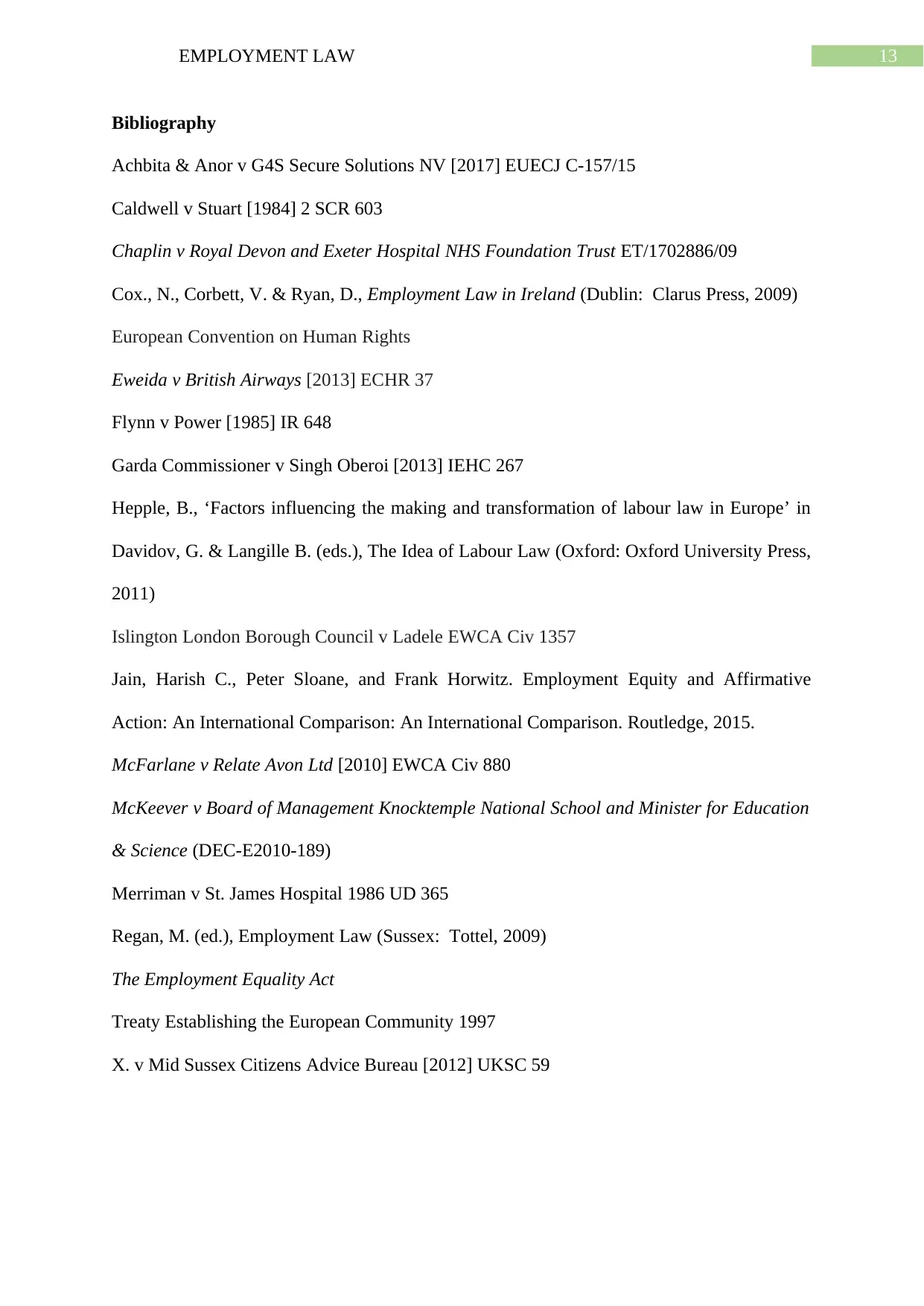
13EMPLOYMENT LAW
Bibliography
Achbita & Anor v G4S Secure Solutions NV [2017] EUECJ C-157/15
Caldwell v Stuart [1984] 2 SCR 603
Chaplin v Royal Devon and Exeter Hospital NHS Foundation Trust ET/1702886/09
Cox., N., Corbett, V. & Ryan, D., Employment Law in Ireland (Dublin: Clarus Press, 2009)
European Convention on Human Rights
Eweida v British Airways [2013] ECHR 37
Flynn v Power [1985] IR 648
Garda Commissioner v Singh Oberoi [2013] IEHC 267
Hepple, B., ‘Factors influencing the making and transformation of labour law in Europe’ in
Davidov, G. & Langille B. (eds.), The Idea of Labour Law (Oxford: Oxford University Press,
2011)
Islington London Borough Council v Ladele EWCA Civ 1357
Jain, Harish C., Peter Sloane, and Frank Horwitz. Employment Equity and Affirmative
Action: An International Comparison: An International Comparison. Routledge, 2015.
McFarlane v Relate Avon Ltd [2010] EWCA Civ 880
McKeever v Board of Management Knocktemple National School and Minister for Education
& Science (DEC-E2010-189)
Merriman v St. James Hospital 1986 UD 365
Regan, M. (ed.), Employment Law (Sussex: Tottel, 2009)
The Employment Equality Act
Treaty Establishing the European Community 1997
X. v Mid Sussex Citizens Advice Bureau [2012] UKSC 59
Bibliography
Achbita & Anor v G4S Secure Solutions NV [2017] EUECJ C-157/15
Caldwell v Stuart [1984] 2 SCR 603
Chaplin v Royal Devon and Exeter Hospital NHS Foundation Trust ET/1702886/09
Cox., N., Corbett, V. & Ryan, D., Employment Law in Ireland (Dublin: Clarus Press, 2009)
European Convention on Human Rights
Eweida v British Airways [2013] ECHR 37
Flynn v Power [1985] IR 648
Garda Commissioner v Singh Oberoi [2013] IEHC 267
Hepple, B., ‘Factors influencing the making and transformation of labour law in Europe’ in
Davidov, G. & Langille B. (eds.), The Idea of Labour Law (Oxford: Oxford University Press,
2011)
Islington London Borough Council v Ladele EWCA Civ 1357
Jain, Harish C., Peter Sloane, and Frank Horwitz. Employment Equity and Affirmative
Action: An International Comparison: An International Comparison. Routledge, 2015.
McFarlane v Relate Avon Ltd [2010] EWCA Civ 880
McKeever v Board of Management Knocktemple National School and Minister for Education
& Science (DEC-E2010-189)
Merriman v St. James Hospital 1986 UD 365
Regan, M. (ed.), Employment Law (Sussex: Tottel, 2009)
The Employment Equality Act
Treaty Establishing the European Community 1997
X. v Mid Sussex Citizens Advice Bureau [2012] UKSC 59
1 out of 14
Related Documents
Your All-in-One AI-Powered Toolkit for Academic Success.
+13062052269
info@desklib.com
Available 24*7 on WhatsApp / Email
![[object Object]](/_next/static/media/star-bottom.7253800d.svg)
Unlock your academic potential
© 2024 | Zucol Services PVT LTD | All rights reserved.





